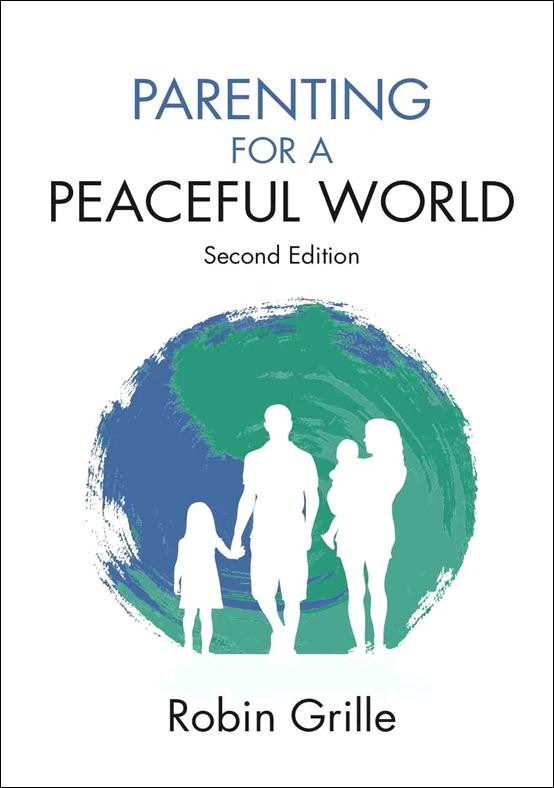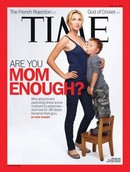Does Time Magazine Have, er… “Attachment Issues?” By Robin Grille
Does Time Magazine Have, er… Attachment Issues?
Sooner or later, it had to happen. The parent-guilt monster is out of its cage: it has been awakened, and it is looking for someone to blame. How did this happen?
Flashback: in the academic world, a quiet revolution was unfolding over the last two or three decades. New waves of research into mother-infant attachment, early brain development and human lactation flooded the lecture theatres of early childhood science. This new science became the nouveau orthodoxy – but outside the halls of learning, nobody (well, almost nobody) noticed.

At first, a tiny handful of parents – mostly around the English-speaking world, took up the challenge of adapting this research into their daily parenting lives (inspired by a handful of now eminent pediatric interpreters). Invisible to the cultural mainstream, these new parents thrived in relatively peaceful anonymity. If noticed, they were all-too-easily dismissed as ‘Hippies’ and ‘radicals’. Like all social movements, this one has had its share of labels; alternating between ‘Attachment Parenting’, ‘Natural Parenting’, Continuum Parenting’, ‘Connection Parenting’ – the tag matters little. Mainstream culture was content to dismiss this new phenomenon into the margins; a mild irritant at best. Nobody suspected what would come next.
Call it what you will; the new parenting movement – driven as it is by an engine of established multi-disciplinary science – has grown, and it has grown fast. With every passing day it gets harder to characterize the new parenting movement as a crowd of dreadlock-wearing fundamentalists or a gaggle of over-anxious, smothering mommas.
The new parenting movement has come of age. How do I know? Because it is finally big enough, assertive enough and conspicuous enough to, well, really piss the mainstream off. Now the regular media wants a piece of you – and for a while, they will not want to play nice.
What have these new parents done to deserve a fear and loathing of the kind that shaped the recent lampooning by Time magazine (as well as a luke-warm but alarmist expose by the Australian 60 Minutes)?
In a nutshell, the very existence of this new parenting style has pushed red-hot buttons everywhere. I think that is perfectly understandable. A breastfeeding toddler must surely be an outlandish and provocative image to people who have never seen or even imagined such a thing. And as today’s early childhood information rains down upon us in ever bigger downpours, millions of parents worldwide are affronted: ‘You are telling me about things I did not and could do for my child – so you are telling me I was not a good enough parent!’. And, as if that were not insult enough: ‘You are telling me that my parents were not good enough, that they damaged me – Oh my God! Am I damaged goods?’
I have been writing parenting articles and books for many years, and delivering parent-education workshops in several countries. And here is what I have noticed: the voice of parent-guilt is everywhere growing louder and more desperate. And it deserves attention and compassion.
Like Jamie Grumet, subject of Time magazine’s voyeuristic article, attachment-savvy parents all over have become the unwilling ambassadors for the practice and science of healthy attachment in early life. Suddenly, anyone carrying a baby in a sling or publicly breastfeeding seems to be under the microscope. Mainstream culture looks on, sees a stranger in its midst, and gets busy looking for a weakness, a crack in the armour, for something to go wrong. Guilt festers and it leads to anger, and the target is usually the messenger. The most guilt-ridden or prudish of traditionalists will, like a heat-seeking missile, look for mistakes, for the scandalous or outlandish – they zero-in and attack. Scandal is the tactic of the most threatened. One attachment-parented kid somewhere breaks a neighbour’s window; and the ‘I told you so’ brigade will come marching out, index fingers all a-wag.
Examples abound. I spoke to one woman whose son’s school counsellor reported her to the authorities for child sexual abuse. Her crime? Breast-feeding a toddler. Another mother had the police turn up at her door – same charge, different crime: co-sleeping. I started to notice this pattern many years ago among my clients (I am a psychologist), and this prompted me to write my article “Banished! – Are parents who follow their hearts left out in the cold?” My article tells the tale of natural parents struggling to fit in, in a detached modern culture that downplays emotionality. You can find the article here: http://www.naturalchild.org/robin_grille/banished.html .
We currently live in an ‘intermezzo’ moment of history: caught in a precarious time-lag between the academic acceptance of the primacy of attachment, and the necessary but incomplete transformation of culture and practice. In other words: the scientists get it, but many doctors, nurses, and parents still don’t (and the media? Forget it!).
So, could this cloud have a silver lining? Speaking about progressive social movements, Gandhi said this: ‘First, they ignore you. Then they laugh at you. Then they fight you. Then you win’.
For ‘attachment’ or ‘natural’ parents, the time of being ignored is over; and the mainstream media has begun to ridicule, judge and smear. I know of no better evidence that the new parenting movement has grown enough to reach – and pass! – a critical tipping point. It is now a big enough minority to cause a stir. Time to fasten seatbelts, there is turbulence ahead! I predict that the garish Time magazine cover and its accompanying unsatisfying article will not be the last volley of arrows aimed at attachment. Case in point: the Australian version of 60 Minutes recently led a story on attachment parenting with the tag-line: ‘attachment parenting is about giving your children everything they want’ – a disastrous misrepresentation.
One thing to remember, attachment parenting has nothing to do with hippies or a return to the tepee or the jungle (although I happen to know many attachment parents who are wonderfully hippy-ish. And if pressed I will confess to being a somewhat ageing semi-hippy myself). Fundamentally, attachment parenting is about science, science and more science. And as it happens, this science is in lockstep with parents’ most heartfelt intuitive impulses. In its application to the first couple of years of a child’s life, this science has no rival.
I think we are witnessing the birth of a movement I like to call the ‘Childrens Liberation Movement’. Remember the Women’s Liberation, the Gay Liberation, and more recently the Animal Liberation movements? Each one of these movements went through the exact evolutionary cycle that Gandhi identified. All were met with great opprobrium, media attacks and smear campaigns. Soon enough, the prevailing culture got used to these social movements; it adapted, co-opted their values and was forever transformed. Legislation followed suit and enshrined these new values for the benefit of all.
Each of these movements profoundly changed the world; so that today’s daily life and relationship styles would be entirely unrecognizable to a 1950s conservative. Got it? Why shouldn’t the same thing happen with the Children’s Liberation movement? In fact, I think this one might wield its transformative power even faster, because unlike previous world-overhauling social movements, this one has the bulk of science behind it – and the internet is its accelerant. Within the lifetimes of most readers, the sight of a mother breastfeeding a four year-old will be commonplace – and therefore unremarkable – in shopping malls, public transport, beaches and restaurants.
So, what can we do to help? I have learned that even a good and worthy truth can be delivered violently. Those of us who embrace the attachment science and practice need to be conscious and sensitive about how we bring this highly charged information to our friends and family. I will make the small number of suggestions that this space permits:
- Don’t be a fundamentalist. The point is, sub-optimal attachment is no one’s fault, none of us should bear the blame for things we did not know. Besides, there are plenty of parents who do not breastfeed at all yet have amazing gifts to give their children. Meanwhile I know many full-term breastfeeders who have all kinds of other major difficulties with parenting. All parents have a mix of strengths and weaknesses.
- Be humble: acknowledge your own shortcomings as a parent. This makes it safer for others to feel OK about their own place on the learning curve.
- Remember, there are no ‘good’ or ‘bad’ parents. We are each as good as the support we have and the information that we have been fortunate enough to receive.
- And most importantly: healthy attachment is not ultimately about ticking all the boxes. (co-sleeping, baby-wearing, child-led weaning, blah-blah). The essence of attachment is connection or attunement. Every one falls short, and connection comes not from getting everything just right! Connection is about helping our children to express all their feelings: their joys and their disappointments.
By the way, we should remember that a magazine like Time is owned by one of the world’s largest and most powerful media corporations. That places them under an obligation to turn a profit – to accentuate the crowd-pleasing bizarre or extreme. The pressure is to titillate the audience (no pun intended). A story that does not stir up controversy, that does not outrage or scandalize, risks being a story that won’t feed the shareholders. Of course they picked the front cover photo whose body language is calculated to weird people out! By having both protagonists standing, the maternal embrace is missing – posturally, the child looks as old as he can be. This is guaranteed to repulse those whose innocent eyes are new to the realities of normal human breastfeeding. A satisfying ‘gotcha!’ scoop.
I hope this might bring some comfort to the family that endured the insensitive exposure, and to other families with similar experiences: I think that indirectly, this muck-raking is a huge endorsement; it says the new parenting movement has come of age. The mainstream media will, for a little while longer, laugh at you, then fight you. Soon there will be a win, as there was for every other ‘Liberation’ movement, and the tipping point gets closer every day. So, take courage, and keep going!!
FOR MORE INSIGHTFUL TRUTH ON THE TIME MAGAZINE COVER, READ “MOTHER, INTERRUPTED” BY THE GREATEST PREGNANCY EVER:
“We are a society of mothers, interrupted. It is no wonder seeing a child who is actually attached to his mother is so disconcerting. It’s like seeing food when you have been starving. You want it, you need it, but you don’t quite trust that its there. It points the finger at what you have been missing. It’s deeply uncomfortable.”



LOVE this article thanks Robin! Will definitely be sharing! Thanks again! xo
What a brilliant article, well written, enlightening and most of all encouraging. Thanks Robin, keep them coming please!
Beautiful article. I could substitute unschooling (life learning, etc) and all would match perfectly — these are one and the same battle for Child Liberation. Namasté and thanks. I will pass this on.
Thanks Robin! What an entertaining & thought-provoking article – spot on.
You inspired me to write a long-overdue post on my own blog in which I’ve quoted some of what you had to say (don’t know if I can link from here to other pages of whether or not it’s appropriate to do so, but I’ve supplied the link below).
“Mother Guilt: To Be Or Not To Be…This Is The Question”
http://lifebeginslactation.blogspot.com.au/2012/09/mother-guilt-to-be-or-not-to-bequestion.html
Cheers, Julieanne